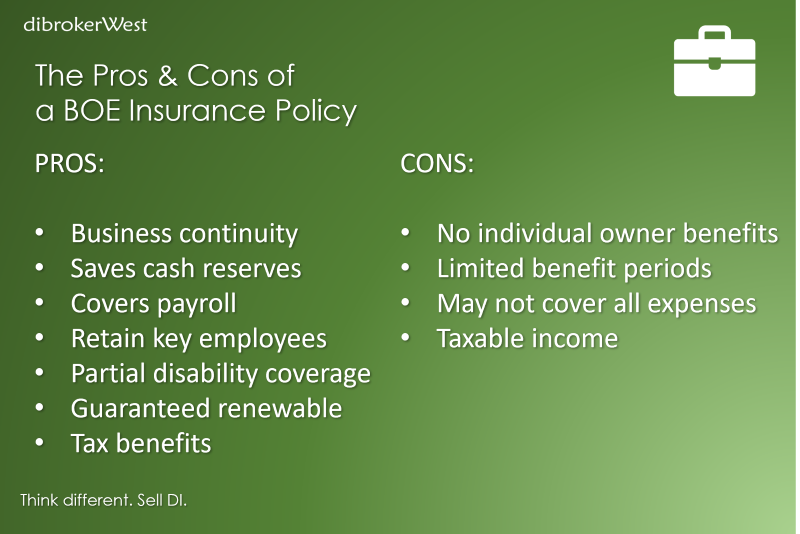Choosing a Business Overhead Expense (BOE) Disability Insurance Policy - dibrokerWest
- Home
- Choosing a Business Overhead Expense (BOE) Disability Insurance Policy
Choosing the right Business Overhead Expense (BOE) disability insurance policy can keep your clients’ business open if the owner becomes disabled. BOE is a specialized disability insurance product that covers essential monthly expenses such as rent, employee salaries, utilities and more—ensuring the business can stay afloat during the owner’s recovery.
When helping your client select a BOE policy, it’s critical to evaluate the business’s overhead structure and potential risks. Here are the key factors to consider.
1. Evaluate Monthly Business Overhead Expenses
Start by calculating the business’s fixed monthly expenses—the costs that persist even if the owner can’t work. These expenses will determine the amount of coverage needed. Common overhead expenses include:
- Office rent or mortgage
- Employee wages and salaries
- Utilities (electricity, water, internet, etc.)
- Business insurance premiums
- Loan or lease payments on equipment
- Office supplies and inventory costs
- Taxes and accounting fees
A clear understanding of average monthly overhead ensures you recommend the right coverage amount to meet real financial needs.
2. Understand the Waiting Period
The waiting period (also elimination period) is the time the insured must be disabled before benefits begin. Most BOE policies offer options ranging from 30 to 90 days.
- Shorter waiting periods (e.g., 30 days) provide quicker benefit payouts but come with higher premiums.
- Longer waiting periods (e.g., 60 or 90 days) reduce premiums but require the business to cover expenses in the meantime.
Consider your client’s cash reserves and the business’s ability to weather a temporary revenue gap.
3. Select the Right Coverage Duration
BOE policies typically provide benefits for 12 to 24 months. Choosing the right benefit period depends on:
- How long a recovery from disability is likely to take
- The complexity of the business and how dependent it is on the owner
- Whether there are partners or managers who can step in temporarily
Smaller, less complex businesses may only need 12 months of coverage, while larger or more dependent operations might benefit from a full 24-month term.

4. Review Exclusions and Limitations
Every policy contains exclusions and limitations. Common exclusions include:
- Disabilities stemming from pre-existing conditions
- Injuries resulting from self-harm or illegal activities
It’s also important to review benefit caps for specific categories—such as rent or wages. Carefully review these with your client to avoid surprises during claim time.
5. Consider Optional Riders
Riders can enhance BOE policies to meet specific business needs. Consider:
- Residual disability rider: Provides partial benefits when the business owner is only partially disabled.
- Future increase option: Allows for additional coverage as the business grows, without further underwriting.
- Cost of living adjustment (COLA): Helps benefits keep pace with inflation.
If your client is actively growing their business or has unpredictable income, riders like the future increase option may be especially valuable.
6. Compare Premiums and Potential Discounts
Premiums vary based on factors like:
- Total monthly coverage
- Waiting period duration
- Length of the benefit period
Many carriers offer business overhead expense premium discounts if the product is bundled with personal disability or other business insurance. Check with your dibrokerWest Sales Rep to explore any available business-owner or multi-policy discounts.
7. Choose a Trusted Insurance Carrier
Policy terms are only as reliable as the company behind them. Ensure your client’s BOE policy comes from an insurer with:
- Strong financial strength ratings (e.g., AM Best, S&P)
- A reputation for responsive claims service
- Experience in business disability coverage
Working with a carrier known for financial stability and excellent customer support adds peace of mind for you and your client.
Final Thoughts:
Business overhead expense disability insurance is a smart way to protect your client’s livelihood—and the livelihoods of their employees. Taking the time to select the right policy ensures the business can continue to operate during the owner’s recovery. Reach out to your dibrokerWest team for help designing the right plan for your client’s unique business structure.

